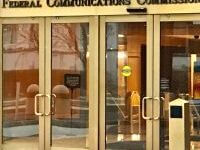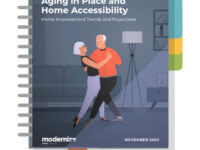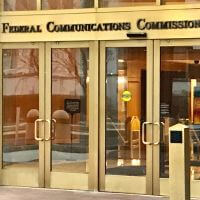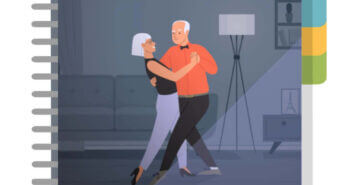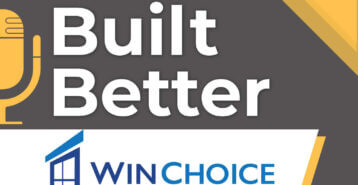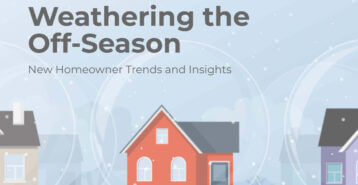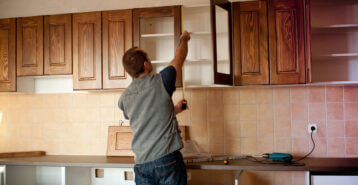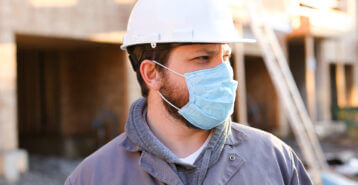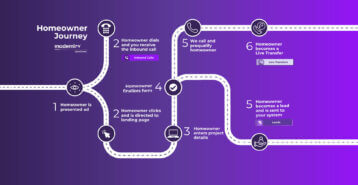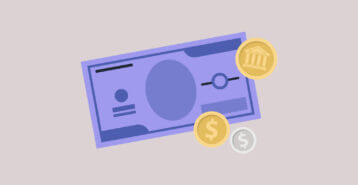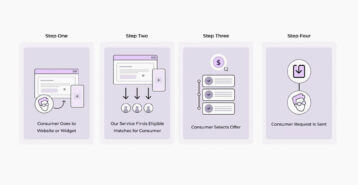At Modernize, we understand the difficulty and severity of navigating this global pandemic. This unprecedented situation remains challenging for us all as individuals and has disrupted many industries. Despite current challenges, we believe this unique period can also inspire new, innovative ideas for your business.
Cultivating your sales pipeline is integral for maintaining and growing your business. Homeowner demand is still steady. At Modernize, we survey our homeowners on a weekly basis to learn more about their home improvement preferences and pain points. Our most recent survey reveals 57 percent of homeowners plan to begin their home improvement project in the next two to four weeks. Now is the time to market your business and reach homeowners in need.
To better highlight how our contractors are adapting their marketing and sales strategies during this pandemic, we wanted to share our recent conversation with DaBella. DaBella is one of the top 10 home improvement service providers in the country. During the pandemic, DaBella was able to make swift changes to boost team morale, engage with homeowners safely, and grow their business.
In the interview below, Dom Pucci, Modernize’s manager of enterprise/mid-market accounts, speaks with DaBella’s president, Donnie McMillan, Jr.
Thank you for speaking with us. Our first question is, how is your team functioning now, during COVID-19, compared to your business as normal?
Donnie McMillan: We immediately went into “what do we do next?” Strategy meetings became critical. And as we were looking at our possibilities, one of the things we started looking for [were] new opportunities. When most people [said] “Hey, we’ve got to shut down or downsize”, we started looking at opportunities for us to expand.
We strategically shut down some of our project classes. We shut down baths in Washington, immediately. That project class typically goes to people past their 60s. With COVID, and that being the most dangerous demographic— we need to not be so exposed in that one project class. We’re in the very first state that was hit. Over 50 percent of our business is based out of Washington state.
From a morale perspective, what has been the key to staying positive and leading your team over the past couple of weeks?
Constant communication. Every morning, we have an hour meeting that goes for all of our branches and our executives. [This includes] the COVID updates of the day, which as you can imagine is quite a moving part. We like to make sure that everybody has all the information.
Our first priority when this started was [to create] a “Keep Everyone Safe” initiative. One of the things we ask every single morning is, “What are we doing that’s safe?” Our people are required to wear masks, and everybody is social-distancing. Our company takes this seriously to make sure that everyone is safe.
We also started keeping people motivated by essential employee pay, so it gave everybody a pay increase.
That’s the opposite of what we’re hearing in news reports with other industries.
Yeah, our $15/hour employees went up to $20/hour. We wanted to make sure that everybody knew how important they were to the company, and that we’re fighting through this as a team. So, first, we’re going to keep you safe. Second, we recognize that a lot of people are losing their jobs, but we know that we’re essential. We need those people to still show up. We wanted to show the employees that not only do we want to be safe, but we wanted to take care of them as they’re taking care of people so that they knew that they were valued.
We’re actually breaking records. Last year, for the month of April, we put out 3,500 leads. A year later, we’re going to put out 3,800 leads. That’s in the middle of this crisis. And we’re going to have 20 percent more volume than we did last year.
One of the things we’re trying to understand is how you’re navigating COVID-19 from a sales perspective. Are you still sending your sales reps out to the homes?
We made a hard pivot into virtual at the very first part of [the pandemic]. Our marketing team had created a universal transcript and sales process that we attempted to do.
When we first started, we were a 50/50 split: 50 percent virtual, 50 percent trying to still send people out to people’s homes. We found the virtual appointments didn’t work that well. We had trouble getting [customers] to show up for them, and it didn’t do what they wanted it to do. Our closing percentage was a little bit less on virtual appointments. It [dropped] about 15 points compared to our normal appointments.
After the initial scare, we went more toward, “Hey, we’re going to practice social distancing.” We came up with our formula for our sales representatives. They’re all in masks, and they’re required to be six feet away. We bought them all foldable tables that are exactly six feet long for their cars, and we tell the customer that we’ll do one of two things: We’ll sit outside, or we’ll be on your porch and talk to you through your window to make sure that we distance.
Surprisingly enough, we do very well with that thought process. Customers loved it, and most of our virtual appointments have diminished. We’re down to 10 percent virtual, and we’ll still do those, but most customers are like “Eh, I don’t care. As long as you socially distance and stay on the outside of the house, we’re good.”
[Social distancing] has provided a little bit of a challenge with installations, but as far as the sales process goes, that’s how we’ve adapted.From a marketing perspective, can you share how you’re communicating with homeowners?
Most of our homeowners are bored right now. So as long as you’re socially distanced, their responses are more along the lines of, “If you guys can come out, and you want to, knock yourselves out.”
I know it sounds counterintuitive, but they only care about, “Are you going to be able to social distance? How are you going to come out and do the appointment?” So, the only changes to our script were, “Hey, just want to let you know, we’re still able to give you estimates, but we have to practice social distancing.”
Our script changed to “What you can expect”. You have to remember, for some of the states we’re in, this has been going on since the end of February, so our people have changed. In the beginning, we had a lot of [homeowners saying], “Why are you calling me?”. We had to explain what essential and nonessential was to our customers, but now, they just don’t care as much.
How has the utility of financing shifted?
That’s been the most brutal thing so far. A lot of the banks have changed their restrictions and their guidelines so badly that we’ve lost all of our subprime lenders. It has affected us. Thirty percent of our business prior to this was subprime, meaning they were not grade-A credit. We’ve lost the ability to finance those people currently. That is a big issue that we’re facing.
I’ve got my team prepared for 2008 all over again. We’re very much taking that approach to this. We’re expanding as fast as we can to take advantage of other [businesses/competitors] withdrawing or shrinking to get their market share. At the same time, we’re preparing ourselves for this being the next credit mess we’re going to have.
We know that when recessions occur, the home improvement industry often benefits. People are staying in their homes longer, and that means they need to make alterations or upgrades. The only problem is offering people financing in areas where they can’t get financing.
There are a few of my markets where I’m concerned with that, but it’s like everything else. It’s kind of a strategy game.
Financing companies are always interesting because some will be a little more aggressive than others. It’s a matter of finding the newest financing program that’s come out, and you find ways to win.
At the same time, we’re very much into training our sales teams [to mentally prepare for an] environment like today’s. I’ll give you our sales secret right now: We know that we have to have a customer that is more concerned about their home improvement project than the potential of being unemployed and the potential danger of coronavirus. If we don’t overcome that thought process, then they’re not going to buy from us no matter what. It’s in our sales training on an every-week basis. How do you get your customer to relax and overcome those fears?
There’s a great quote out there: “What’s there to fear, but fear itself?” We’re deciding not to participate in the fear aspect. We know that it’s real, but we’re not going to let fear guide our decision-making. We’re letting statistics and data drive our decision-making.
How do you see the industry adjusting to how we approach relationships with homeowners? Do you feel like after COVID-19 life will go back the way it was? Or is there going to be a digital shift?
I think you’re going to have more of a digital shift. The virtual appointments that we do have, [customers] like being able to take that 3D model and play around with it before somebody gets there. I think this cycle is going to change the consumer dramatically. The [virtual appointments] that we do, people love them. I believe we’re headed that direction and this is going to cause faster growth in that segment.
One of the things that we’re definitely paying attention to is, how do we capture that market? We’ve just now started launching more campaigns, and promoting on Facebook and digital marketing [platforms] about making an appointment without needing someone to go see you. The [customers] who are requesting the [virtual] appointments are the ones who are showing up.
Thank you so much for your insights and your time.
Want to share your business’ COVID-19 story? We’d love to hear more from our contractors and the successes and challenges you are experiencing. You can email us modmail@modernize.com.
